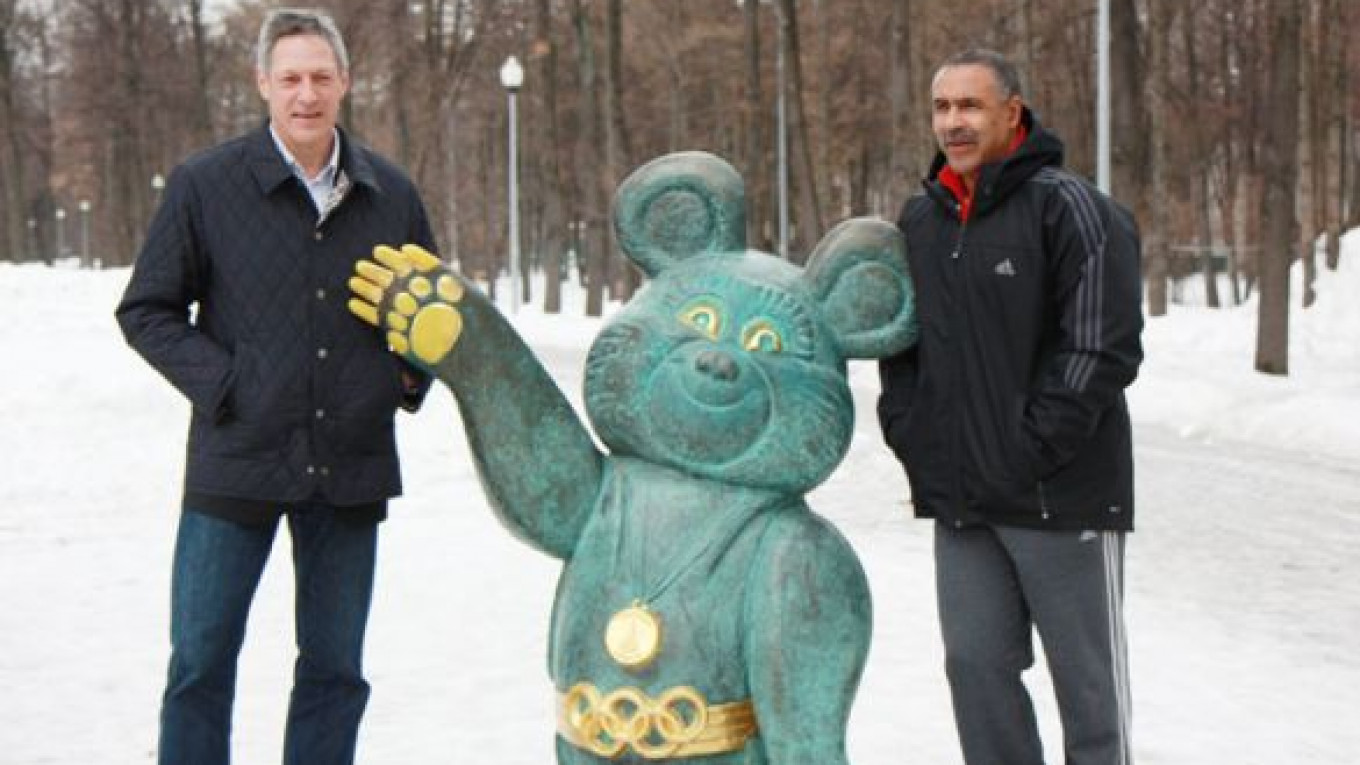Two British sporting legends, Daley Thompson and Allan Wells, returned to the site of their greatest success to mark the start of the 500-day countdown to the 2012 London Olympics.
Wells and Thompson joined Russian sporting champions at a reception at the British Embassy residence Thursday before a visit Friday to Luzhniki stadium, where they both won gold medals at the 1980 Summer Olympic Games.
Thompson won the decathlon while Wells won gold and silver in the 100-meter and the 200-meter track events, respectively, at a games marred by a boycott by the United States and allies in protest against the Soviet invasion of Afghanistan.
“Winning a gold here which then was considered ‘behind the Iron Curtain’ was really something special,” Wells said. “There was a lot of miscomprehension about Russia but they really opened their doors. The organization was excellent and this really helped me focus — and allowed me to win two medals.”
Thompson reminisced about shopping in Moscow during the games. “We went into the center and into this place, and my wife came out with a big smile on her face and a fur coat in her hand,” he said. “And I came out with an empty wallet!”
Shops were stocked far better during the games than normal as the Soviet government tried to impress the legion of foreign visitors.
More than 60 countries boycotted that games, but the British Olympic Association voted to go despite government opposition.
Wells has said in previous interviews how he was pressured not to go.
“There was a picture with a letter saying this is what the Russians are doing. It showed a dead Afghan girl with a doll. I can still see the picture even now as if it were yesterday,” Wells told The Guardian newspaper in 2006. “My first thought was ‘what’s going to happen if I don’t go?’ A Russian soldier isn’t going to say, ‘oh, Allan Wells isn’t coming. I’m not going to shoot somebody.’”
Wells won in a photo finish in a 100 meters with a weakened lineup because of the boycott by the United States, whose Stanley Floyd was the favorite in the run-up to the games. His absence meant that some felt that Wells’ victory was tarnished. Two weeks after the end of the games, Wells faced off against Floyd and three other Americans who missed the Moscow Games at a meet in Koblenz, Germany. He made the final as the slowest qualifier but still won.
Mel Lattany, one of the American athletes, came up to him afterward and said, “I’m delighted for you. Even if we were in Moscow you would’ve won,” Wells told The Guardian.
Thompson retained the decathlon gold in Los Angeles in 1984.
As the two went around the stadium the next day, Wells noted the differences between 2011 and 1980.
“The roof in the stadium wasn’t here before, the seats were wooden — it’s changed quite a bit,” he said.
The two asked to see Misha, the Olympic mascot who floated into the sky at the closing ceremony, and also posed by a plaque on the stadium exterior that listed their names in Cyrillic as gold medal winners from that Games.
With the Sochi Winter Olympics only three years away, the visit is part of growing cooperation between the two Olympic hosts. Nevertheless, the two are expected to be close rivals in the medals table in London.
“Though, of course, I’m a patriot and I support Russia, I think [Great Britain] has more chances this time,” said Dmitry Nosov, the judo bronze medalist at Athens in 2004 who famously fought on despite a broken collarbone.
“You know, the Russian team always beats us,” said an optimistic Thompson. “But this time we’re on home ground so maybe we’ve got a chance.”
A Message from The Moscow Times:
Dear readers,
We are facing unprecedented challenges. Russia's Prosecutor General's Office has designated The Moscow Times as an "undesirable" organization, criminalizing our work and putting our staff at risk of prosecution. This follows our earlier unjust labeling as a "foreign agent."
These actions are direct attempts to silence independent journalism in Russia. The authorities claim our work "discredits the decisions of the Russian leadership." We see things differently: we strive to provide accurate, unbiased reporting on Russia.
We, the journalists of The Moscow Times, refuse to be silenced. But to continue our work, we need your help.
Your support, no matter how small, makes a world of difference. If you can, please support us monthly starting from just $2. It's quick to set up, and every contribution makes a significant impact.
By supporting The Moscow Times, you're defending open, independent journalism in the face of repression. Thank you for standing with us.
Remind me later.






